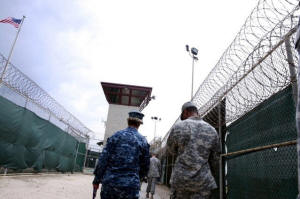|
Guantanamo, rights issues in defense bill
divide Congress
 Send a link to a friend
Send a link to a friend
[May 19, 2016]
By Patricia Zengerle
WASHINGTON (Reuters) - The top Democrat on
the U.S. House of Representatives Armed Services Committee announced his
opposition on Wednesday to the 2017 defense authorization bill,
underscoring the partisan divide over the $602 billion defense policy
measure.
|

A U.S. Navy sailor (L) walks with soldiers in Joint Task Force
Guantanamo's Camp VI at the U.S. Naval Base in Guantanamo Bay, Cuba
March 22, 2016. REUTERS/Lucas Jackson |
|
 Representative Adam Smith said changes in the bill this week by
Republicans, who control the House, on issues including women's
registration for the draft, transfers from the Guantanamo detention
center and protection for gay and transgender employees of military
contractors, had led him to oppose it. Representative Adam Smith said changes in the bill this week by
Republicans, who control the House, on issues including women's
registration for the draft, transfers from the Guantanamo detention
center and protection for gay and transgender employees of military
contractors, had led him to oppose it.
"These have tipped the balance of the bill considerably," Smith said
in a statement.
President Barack Obama had already threatened to veto the House
version of the National Defense Authorization Act, or NDAA, over a
long list of issues, starting with its use of $18 billion of special
war funds for day-to-day military programs to avoid automatic budget
cuts.
 This week, the powerful House Rules Committee used a procedural move
to remove, without a House vote, an amendment approved by the armed
services committee that would have required women to register for
the military draft.
The Rules panel also decided not to allow debate on an amendment
that would have stripped a "religious protection" measure from the
bill that rights advocates fear would undo the president's 2014
executive order banning federal contractors from discriminating
based on sexual orientation or gender identity.
Smith said he also objected to Republicans' adding further
restrictions on transfers from the military prison in Guantanamo
Bay, Cuba, and reduction in funds for nuclear nonproliferation and
other provisions.
[to top of second column] |

Republicans control 246 seats in the 435-member House, which passed
the bill by a vote of 277-147 late on Wednesday, largely along party
lines, with most Republicans backing the bill and most Democrats
opposed.
However, the Senate will pass its own version of the bill later this
year, which will be reconciled with the House bill to create a final
version of the legislation.
Once passed by the Senate and House, that NDAA would be sent to the
White House for Obama to sign into law, or veto.
(Reporting by Patricia Zengerle; Editing by Tom Brown and Paul Tait)
[© 2016 Thomson Reuters. All rights
reserved.]
Copyright 2016 Reuters. All rights reserved. This material may not be published,
broadcast, rewritten or redistributed.

 |